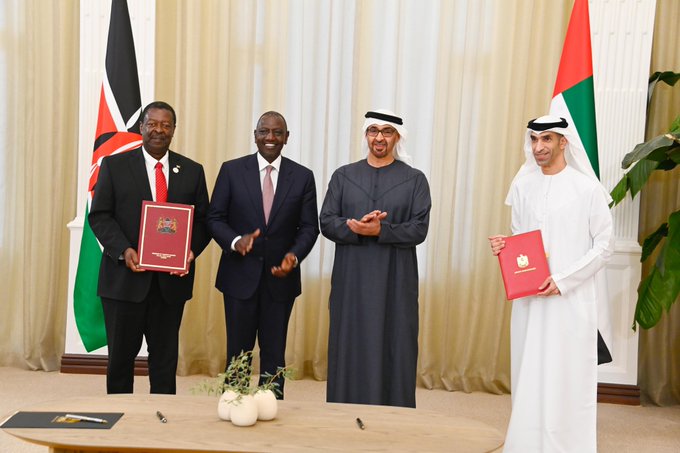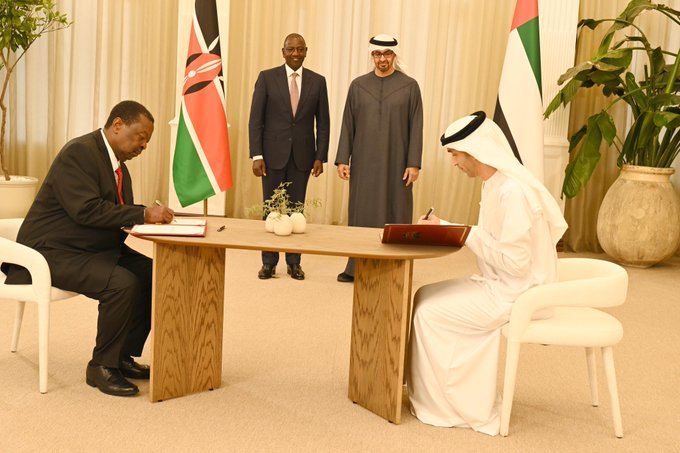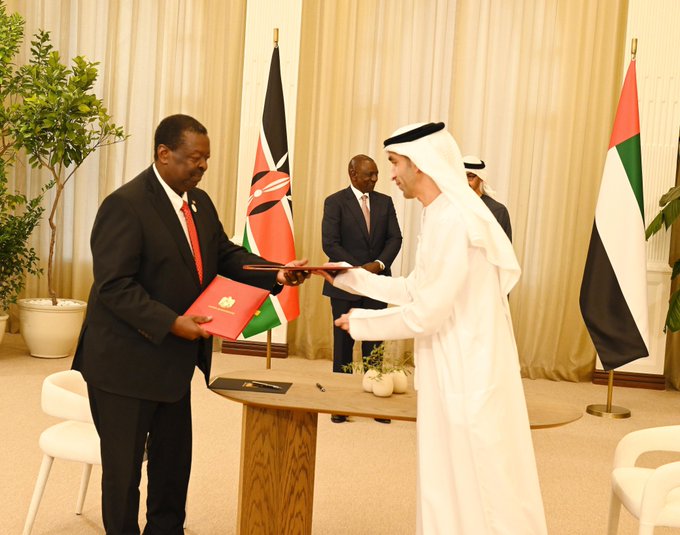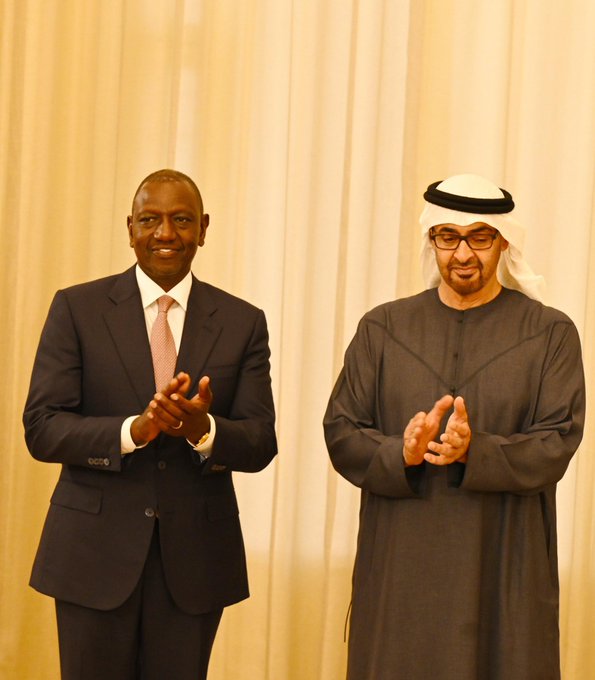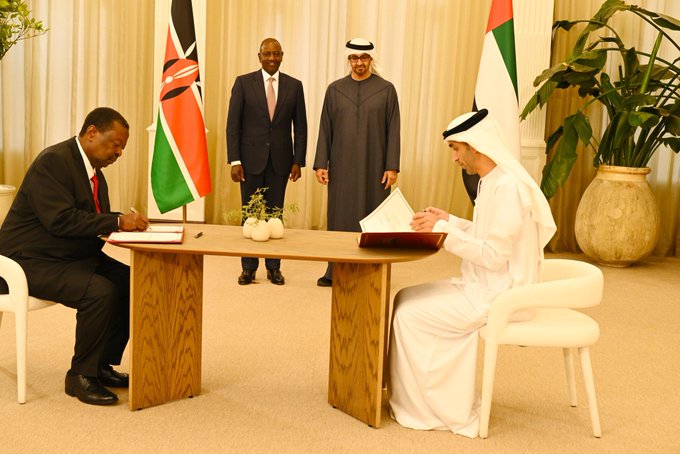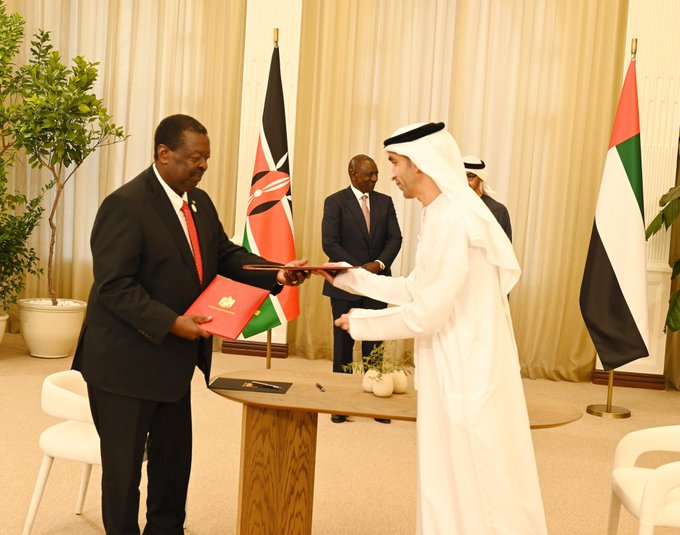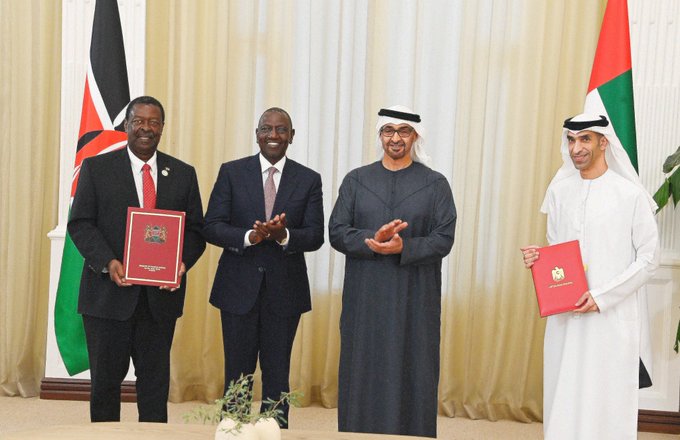ABU DHABI, United Arab Emirates – Kenya and the United Arab Emirates (UAE) have finally signed the historic Comprehensive Economic Partnership Agreement (CEPA).
The signing of the landmark agreement is expected to deepen trade ties between the two nations by simplifying trade procedures, promoting industrialization, and stimulating investment.
According to President William Ruto, the move is expected to surpass Kenya’s exports of meat products, fruits, vegetables, cut flowers, tea, and coffee once implemented.
“The CEPA will also provide the UAE with investment opportunities in the energy, water, agriculture, health, airports, logistics, and ICT sectors,” said President Ruto shortly after signing the agreement.
The head of state indicated that the agreement aligns with the government’s policy of reducing borrowing while enhancing foreign direct investment and public-private partnerships.
H.E. Dr. Thani bin Ahmed Al Zeyoudi, UAE Minister for Foreign Trade, and I have signed the landmark Comprehensive Economic Partnership Agreement (CEPA) between Kenya and the UAE.This agreement opens new horizons for Kenyan exports, granting duty-free access for key products…
President Ruto oversaw the signing of the agreement in Abu Dhabi, United Arab Emirates, in the presence of his UAE counterpart, Highness Sheikh Mohamed bin Zayed Al Nahyan.
In a statement, State House Spokesperson Hussein Mohamed said the CEPA is the first agreement signed by the UAE with a mainland African country and represents a transformative step in enhancing trade, investment, and economic cooperation.
“The agreement strengthens Kenya’s position as a gateway to East and Southern Africa and reaffirms the UAE’s role as a global logistics and financial hub connecting the Middle East, Asia, and beyond,” the statement reads in part.
Trade between Kenya and the UAE has doubled over the past decade. In 2023, total trade between the two countries reached Sh 445 billion, with the UAE ranking as Kenya’s sixth-largest export destination and second-largest source of imports, accounting for 16% of Kenya’s total imports.
What are the key Kenyan export products to the UAE
Kenya’s key exports to the UAE include agricultural products such as meat.
Kenya exported Sh 9.9 billion of these products to the UAE in 2023, representing over half of the country’s total meat exports (Sh 18.3 billion).
Other notable exports include fruits—primarily pineapples, avocados, and mangoes—which account for Sh 5.2 billion.
Additionally, vegetables and flowers, which support millions of livelihoods across the country, generated a further Sh 5.6 billion. In return, the UAE supplies Kenya with critical goods, including petroleum, machinery, chemicals, and other essential products.
“The agreement aims to deepen trade ties by eliminating barriers to trade, simplifying customs procedures, and promoting industrialisation and regional value chains,” Hussein further said.
Kenya-UAE stronger ties.The Comprehensive Economic Partnership Agreement (CEPA) marks a significant step towards enhancing economic ties between the two nations.The agreement aims to facilitate easier market access for Kenyan products into the UAE, with a particular focus on…
Hussein stated that the CEPA goes beyond trade in goods by addressing services, technological innovation, digital trade, and sustainability.
“It opens new opportunities for Kenyan service providers in sectors such as education, transport, communications, construction, and engineering to access the UAE market,” he added.
According to the Kenyan government, the partnership aligns with Kenya’s Bottom-Up Economic Transformation Agenda (BETA) by unlocking new markets for priority value chains, attracting foreign direct investment, and promoting technology transfer to support livelihoods across the country.
Why Kenya is Africa’s gateway to the world
The CEPA also reflects a shared commitment to sustainability and green economic growth.
Hussein disclosed that both countries have agreed to promote clean technologies and environmentally responsible practices to ensure sustainable economic progress.
Nairobi indicated that the agreement builds on Kenya’s broader trade strategy, which includes key contracts such as the Kenya-U Economic Partnership Agreement, the Kenya-UK Economic Partnership Agreement, the African Continental Free Trade Area (AfCTA), and the African Growth and Opportunity Act (AGOA) with the United States.
“Today, Kenya has become Africa’s gateway to the world, with duty-free, quota-free access to global markets representing nearly half of the world’s GDP. The signing of the Kenya-UAE CEPA is expected to unlock new opportunities, enhance bilateral relations, and contribute to the economic transformation of both nations,” Hussein stated.
The signing of the historic Kenya-United Arab Emirates Comprehensive Economic Partnership Agreement (CEPA) will deepen trade ties between the two nations by simplifying trade procedures, promoting industrialisation and stimulating investment.It is expected to more than triple…
Hussein further said: “It sends a clear signal to global markets of Kenya’s readiness to expand its role as a global trade partner by offering premium products and services while embracing innovation and sustainable development.”
The CEPA will also provide the UAE with investment opportunities in several sectors of the Kenyan economy, including energy, water, agriculture, health, ports, airports, logistics, human resource development, and ICT.
“This aligns with the Kenyan government’s policy of reducing borrowing, enhancing investment capital, foreign direct investment (FDI), and public-private partnerships (PPPs),” the statement from State House Kenya further reads.



